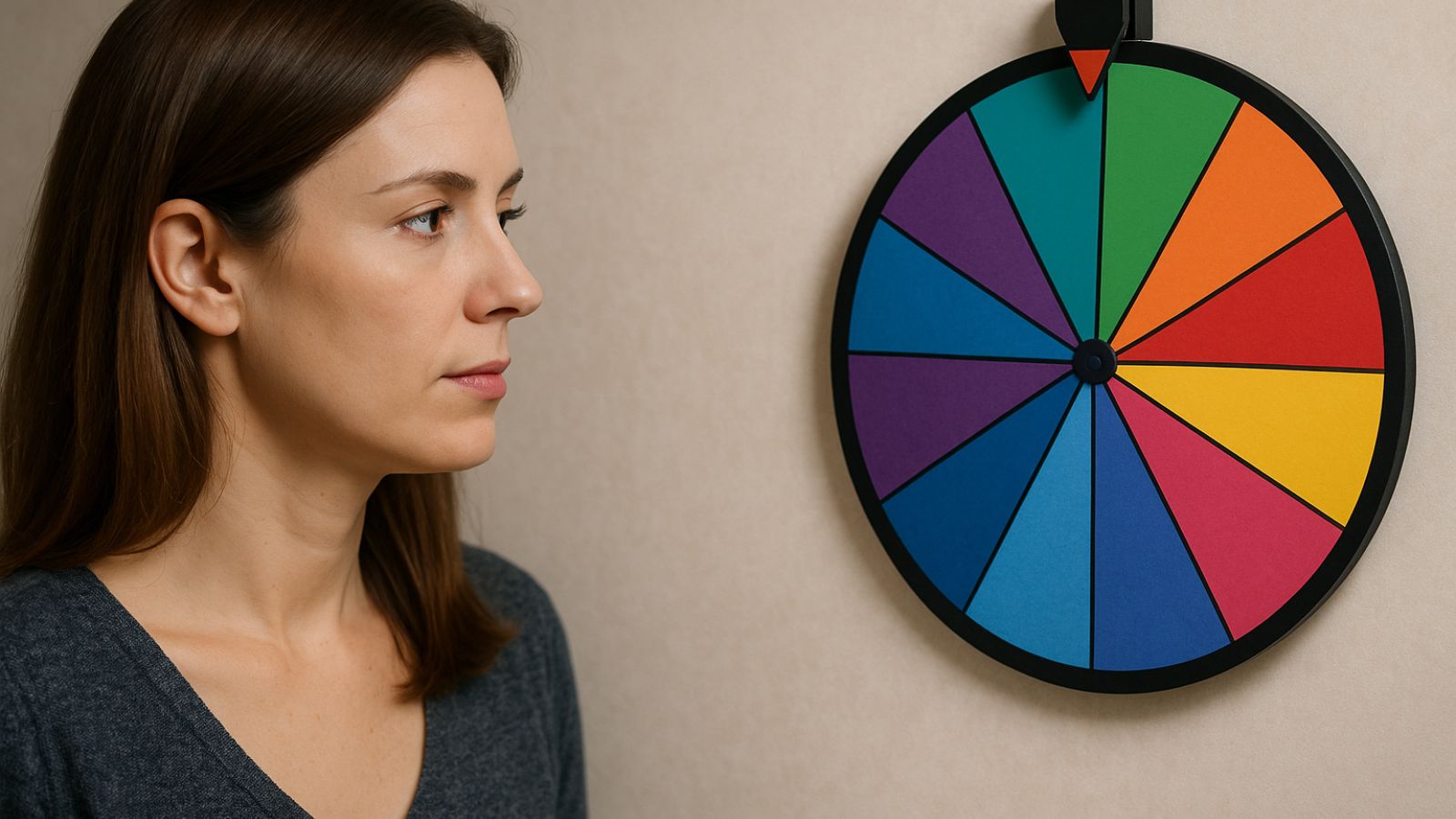Have you ever watched a roulette wheel spin and felt a little thrill in your chest — that strange mix of hope, excitement, and “maybe this time it’ll land on my number”? Or maybe you’ve tapped “shuffle” on Spotify and genuinely believed the next song would perfectly match your mood? If so, you’ve experienced one of the most fascinating quirks of the human brain: our tendency to trust randomness.
But here’s the twist — randomness, by definition, isn’t trustworthy. It’s unpredictable, patternless, and completely indifferent to your hopes. And yet, deep down, our brains crave patterns, seek fairness, and love the illusion that chance has meaning.
So why do we trust random outcomes — and sometimes even feel betrayed by them? Let’s take a deep dive through psychology, neuroscience, and human behavior to uncover the reasons behind our relationship with chance.
The Human Brain Hates Chaos (But Pretends It Loves It)
Let’s start with something simple: humans hate uncertainty. Our ancestors survived by spotting patterns — noticing that rustling in the grass might mean danger, or that dark clouds mean rain. Over time, our brains evolved into pattern-detection machines, as explained by Steven Pinker and other cognitive scientists.
The problem? Sometimes our pattern detector goes into overdrive. We see faces in clouds, meaning in coincidences, and luck in randomness. Psychologists call this apophenia — the tendency to perceive connections where none exist.
So when we spin a wheel, flip a coin, or draw a card, our brains quietly whisper:
“There’s a reason this is happening. You’re due for a win.”
That’s not randomness. That’s your brain trying to make sense of chaos — and it feels good to think we can.
The Illusion of Control: Our Favorite Cognitive Trick
One of the most powerful cognitive biases that drives our trust in randomness is what psychologists call the illusion of control. Coined by Ellen Langer in her famous 1975 study, it describes our belief that we can influence outcomes that are purely random.
Ever found yourself blowing on dice before a throw? Or clicking the “spin” button just right on a slot machine? That’s your illusion of control at work.
What’s fascinating is that even when people know something is random, they still behave as if skill or ritual can sway the result. In gambling studies, people bet higher amounts when they throw the dice themselves versus when someone else does — even though the outcome is identical.
It’s not stupidity. It’s psychology. Our brains evolved to connect effort with outcome, and randomness short-circuits that logic. To preserve the illusion of agency, we simply pretend randomness is predictable.
Randomness Feels Fair (Until It Doesn’t)
Humans often trust randomness more than people.
Why? Because randomness feels fair.
Think of it this way — if a teacher picks a random student to answer a question, everyone accepts it. But if the teacher chooses someone deliberately, suspicions arise: “Why always me?”
Randomness has a strange moral authority. It removes bias, ego, and intention. In psychology, this connects to procedural justice — the idea that we care as much about how decisions are made as about what the decisions are.
That’s why we trust lotteries, random draws, and algorithms (at least at first). Randomness feels impartial, democratic, and honest.
Until, of course, the wheel stops on someone else’s number three times in a row — and suddenly randomness feels rigged.
The Gambler’s Fallacy: “It’s Gotta Be My Turn”
Here’s where things get interesting (and a little dangerous). The gambler’s fallacy is the mistaken belief that past random outcomes affect future ones.
If you’ve ever said, “It’s due to land on red,” while staring at a roulette table — you’ve fallen for it.
The truth? Every spin is independent. But our brains can’t stand that. We crave balance — we expect a fair world. Psychologist Amos Tversky and Nobel laureate Daniel Kahneman showed in seminal research that people mentally simulate randomness as self-correcting.
To us, five heads in a row just doesn’t feel random — even though it can be. We expect the next coin flip to “fix” the pattern, restoring balance to the universe.
The Magic of Rituals and Superstitions
If randomness is so cold and heartless, why do we wrap it in rituals? From lucky charms to “don’t jinx it” phrases, humans surround random events with symbolic meaning.
Anthropologist Bronisław Malinowski observed during World War I that Trobriand Islanders performed more rituals before deep-sea fishing than lagoon fishing — because the sea was unpredictable. The more random the environment, the more rituals we invent.
Superstitions aren’t stupidity — they’re emotional safety nets. They help us cope with uncertainty, giving us a sense of psychological stability when control is impossible.
So, whether it’s wearing your “lucky socks” before an exam or touching wood before a presentation, you’re basically building a tiny fortress against randomness.
The Dopamine Loop: Why Random Rewards Feel So Good
Here’s where neuroscience enters the picture.
Our brains love random rewards. In fact, the dopamine system — the same one that drives motivation and pleasure — is most active when rewards are unpredictable.
Studies on variable reward schedules (like in B.F. Skinner’s classic experiments) show that random reinforcement creates the strongest habit loops. This principle powers everything from slot machines to social media notifications.
That little red “heart” on Instagram? It’s not just feedback. It’s a dopamine bomb, delivered on a random schedule, keeping you hooked just like a player at the casino.
Quick Visual: Why Random Rewards Hook Us
Here’s a simple diagram to visualize how this works:
Action → Random Reward → Dopamine Spike → Anticipation → More Action
↑ ↓
(Unpredictability keeps the loop alive!)
When outcomes are predictable, dopamine flattens.
When they’re random — the brain lights up.
A Personal Anecdote: My “Lucky Coin” Moment
I once carried a “lucky coin” in my wallet for five years. It started as a joke — a friend flipped it to decide where we’d eat, and it landed on my favorite restaurant. That night, I called it my magic coin.
Every time I used it to make small decisions, things seemed to go my way. Coincidence? Probably. But my brain didn’t care. The coin became my personal ritual against uncertainty — a physical symbol of trust in randomness.
One day I lost it… and immediately had a bad day. Of course, it wasn’t the coin. It was me. I’d built a story around it — because stories make chaos tolerable. That’s what we all do.
Insights: Randomness, Meaning, and the Stories We Tell
At our core, humans are meaning-making machines. Even in randomness, we crave narrative. We interpret chance through the lens of emotion, memory, and hope.
Randomness feels exciting because it mirrors life itself — unpredictable, sometimes unfair, but always full of potential. The spin of the wheel isn’t just a gamble; it’s a metaphor for human optimism.
We trust random outcomes not because they’re reliable, but because they give us something to believe in when everything else feels uncertain.
People Also Ask
1. Why do people think random outcomes are fair?
Because randomness removes human bias, it feels impartial — even when it isn’t.
2. Can randomness ever be predicted?
Not truly. Algorithms can simulate randomness, but genuine unpredictability is part of nature.
3. Why do we like gambling if it’s risky?
The brain loves variable rewards — they trigger dopamine and anticipation.
4. Is trusting randomness bad?
Not always. It can make life more playful, but relying on it for big decisions can backfire.
5. Are some people more prone to believing in luck?
Yes. Studies show higher locus of control and optimism bias affect belief in luck.
10 Frequently Asked Questions (FAQs)
1. Is there any science behind “feeling lucky”?
Yes. It’s linked to optimism bias and dopamine regulation. Feeling lucky can even boost confidence and risk-taking.
2. Why do slot machines use spinning wheels?
Because the visual spin amplifies anticipation and mimics control — a psychological trick.
3. Do random outcomes affect our emotions more than predictable ones?
Absolutely. Unpredictable wins or losses hit harder emotionally, according to neuroeconomic research.
4. What’s the difference between chance and fate?
Chance is random; fate implies intention. Humans often confuse the two because both reduce uncertainty.
5. Why do people believe in “hot streaks”?
That’s the hot-hand fallacy — the belief that success breeds more success, even in random contexts.
6. Are algorithms really random?
Not quite. Most are pseudo-random, meaning they appear random but follow patterns.
7. Can randomness reduce stress?
In small doses, yes. Games of chance can trigger flow states and distract from overthinking.
8. Why do we enjoy lotteries even with tiny odds?
Because imagination overrides math — the dream of winning activates hope circuits.
9. Are there cultures that celebrate randomness?
Many. From the Chinese I Ching to Western tarot cards, random outcomes are often seen as divine signals.
10. Can understanding randomness improve decision-making?
Definitely. Recognizing bias helps us separate luck from logic — a key skill in finance, relationships, and life.
Final Thoughts: Embracing Chaos (The Smart Way)
In a world that often feels too controlled, randomness offers a breath of freedom.
It reminds us that not everything is planned — that surprises still exist, that fortune sometimes smiles just because.
But the real power lies in awareness. When you understand the psychology behind randomness, you can enjoy the thrill without being fooled by it. You can flip a coin, roll a die, or hit “shuffle” — not because you expect control, but because you embrace the adventure.
After all, life itself is the ultimate random spin.



